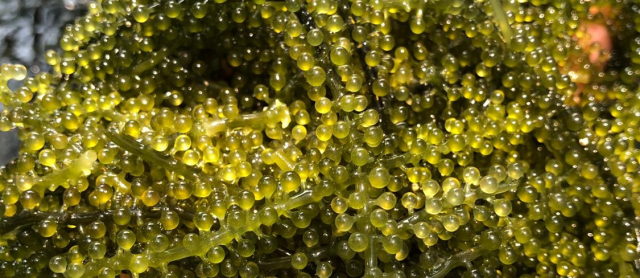Sustainable approaches of aquaculture, such as co-culture and the husbandry of organisms low in the food web, have a long tradition in Asia and the direct consumption of algae is a regular part of the people's diet.
Sea grapes (also “green caviar”, Caulerpa lentillifera) are green macroalgae characterized by their special texture, a high nutritional value and antioxidant capacity. The alga is of high demand in Japan, Singapore and China and has a big potential to contribute to food security while enabling a sustainable culture.
The project “SeaGrapes” aims in a first step at exploring the details of ecology and physiology of this remarkable seaweed, including secondary metabolites and the antioxidant capacity of organisms, both in the pond and the packaging environment.
In a second step, the co-cultivation of sea grapes with other algal species, potentially a high value red seaweed, will be tested. Furthermore, the bioremediation potential will be explored to assess the use of sea grapes in multi trophic systems.
The project will apply a combination of laboratory experiments and field studies and is based on a close cooperation with a sea grape farm (VIJA) in Van Phong Bay and the Institute of Oceanography (IO) in Nha Trang, Vietnam.
Project partners |
|---|
|
Marine Botany (Uni Bremen) Institute of Oceanography – IO (Nha Trang, Vietnam) Vija Company, (Nha Trang, Vietnam) USP University of the South Pacific (Fiji) |





